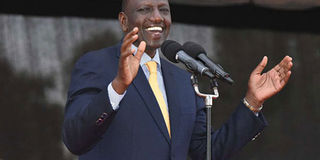The ‘dynasties versus hustlers’ narrative is as fake as can be

Deputy President William Ruto. PHOTO | FILE | NATION MEDIA GROUP
What you need to know:
This storyline of “dynasties vs hustlers” that has been circulating in Kenya, and which is peddled by excitable bloggers who seem to be guided by a hidden hand, is really a red herring.
Rags-to-riches stories are as old as life. But they don’t inspire when you cannot draw a clear and ethical line of your journey from penury to riches, from the village hut to the gilded mansion.
When people are not too eager for their true selves to be unmasked, they throw up smokescreens like this “dynasties vs hustlers” nonsense. It’s pathetic.
In these days of unprecedented intrigues within Kenya’s topmost leadership, I always follow with fascination whenever President Uhuru Kenyatta and his deputy, William Ruto, appear at public (as opposed to State) functions together. The old camaraderie is long gone, and all that we see now is a duo putting up appearances. Their coded speeches at these functions barely mask the animus running underneath. Why Ruto, who is usually the one on the receiving end of the presidential barbs, subjects himself to this agony beats me.
SCATHING POTSHOTS
A week ago, the two showed up at an evangelical church celebration in Karen, Nairobi, where Uhuru took the opportunity to state loudly that a review of the constitution will happen. He said so knowing all too well that his deputy, who was present, fundamentally objects to that idea. It was all the more remarkable that Uhuru was speaking in response to the pastor’s sermon which, citing Christ’s supposed providence, had raised issue with the proposed review. Uhuru noticeably did not join his deputy and the rest of the congregation in clapping when the pastor waded into the constitution matter.
Things got stickier at a later function the same day where the pair appeared; the funeral in Gatanga, Murang’a County, of a popular local musician, John DeMathew. The first salvo was fired by former Kiambu Governor William Kabogo, when he pointedly asked the DP to stop his full-time early campaigning for 2022. Kabogo was one of those playing large behind-the-scenes roles at the well-attended funeral, alongside former Gatanga MPs Peter Kenneth and, aha, David Murathe, who has come to be known for his scathing potshots against the DP.
Predictably, when he rose to speak, Ruto rejected Kabogo’s supposition. With that practised (some call it false) deference he affects whenever he is with Uhuru in the latter’s political backyard, the DP argued that he was simply playing his role as the President’s principal assistant when conducting his countrywide tours. This has become a routine thing for Ruto to say, which he does with a straight face. I don’t know why he resorts to this kind of justification, which even five-year-olds, leave alone the President, know is dishonest.
CRIMINAL INVESTIGATION
When Uhuru rose to speak, he took a different tangent. He chose to dwell on the exploitation of local musicians on issues of copyright and ordered a criminal investigation. However, it was apparent that music industry conmen were not the only ones he had in mind. Shifting from Kiswahili to vernacular, he said: “Nobody will be allowed to continue ‘feasting’ from the public till... I’ll chase the crooks everywhere... I am not looking for votes... Public funds must and will be recovered... I don’t have a friend other than the people of Kenya.”
When concluding his speech, the President went cryptic. At the same time he assumed a serious demeanour. Out of the blue, he warned against certain divisive public utterances and narratives being pushed by particular people he did not name, and which he said had the potential to cause serious trouble in the country. He didn’t expound on the nature of those utterances. But, somehow, I got the feeling he wanted to restate a warning he had given days earlier in Nairobi during the annual memorial service for his father, Mzee Jomo Kenyatta, where he criticised the talk of so-called dynasties versus self-proclaimed “hustlers”.
GILDED MANSION
It was Amani party leader Musalia Mudavadi, not too long ago, who made the memorable observation that the late Mobutu Sese Seko styled himself similarly as a hustler, an ordinary Joe. He sold himself as an underdog in contrast to more sophisticated contemporaries such as Congo’s first prime minister, Patrice Lumumba, and the country’s first president, Joseph Kasavubu, both of whom Mobutu deposed. There is hardly a soul in Africa, or the world, who doesn’t know how Congo was turned into Mobutu’s personal cash cow during his three-decade kleptocratic rule. If that was the inference Musalia wanted us to make, the message got home loud and clear.
This storyline of “dynasties vs hustlers” that has been circulating in Kenya, and which is peddled by excitable bloggers who seem to be guided by a hidden hand, is really a red herring. It is as fake as Santa Claus bringing goodies from the unknown. First and foremost, the problem in this country is not “dynasties”. Or self-styled hustlers per se. It is corruption. That is what must be eradicated. Bogus tales of childhood deprivation are a distraction. In any case there is no special wisdom you acquire because of the circumstances of your birth. Rags-to-riches stories are as old as life. But they don’t inspire when you cannot draw a clear and ethical line of your journey from penury to riches, from the village hut to the gilded mansion.
When people are not too eager for their true selves to be unmasked, they throw up smokescreens like this “dynasties vs hustlers” nonsense. It’s pathetic.





